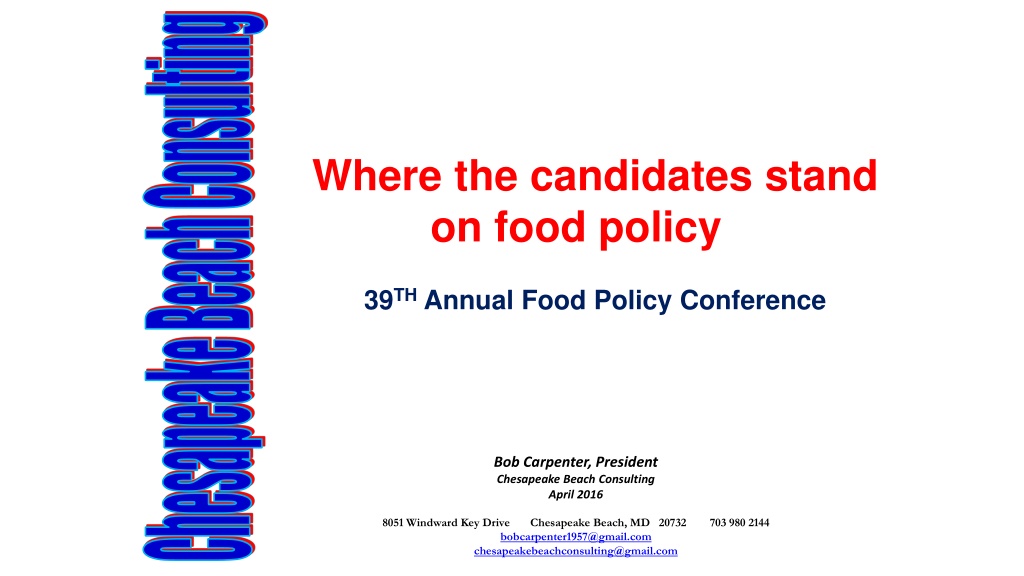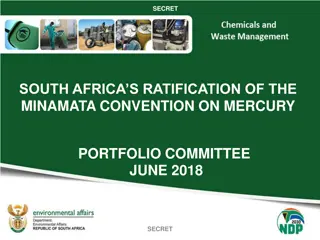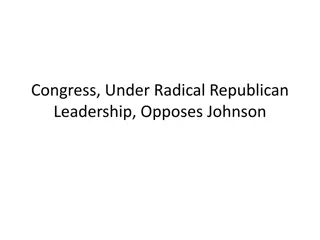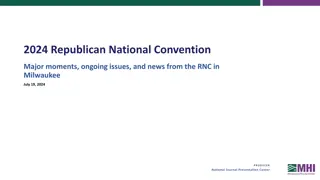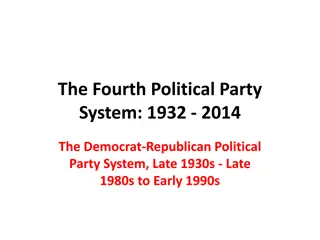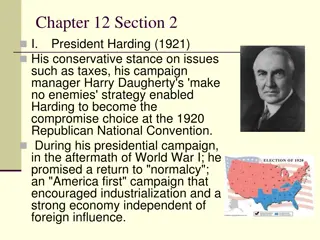Republican National Convention 2012 Food Policy Stance
The 2012 Republican National Convention platform emphasizes the importance of protecting farmers, agricultural production, and exports in the U.S. economy. It discusses issues such as the cost of food under current policies, uncertainties in agriculture, federal programs to manage risk, USDA's role in agricultural research, water rights for farmers, and more. The stance highlights the significance of agriculture in supporting the economy, job creation, and food security both domestically and internationally.
Download Presentation

Please find below an Image/Link to download the presentation.
The content on the website is provided AS IS for your information and personal use only. It may not be sold, licensed, or shared on other websites without obtaining consent from the author.If you encounter any issues during the download, it is possible that the publisher has removed the file from their server.
You are allowed to download the files provided on this website for personal or commercial use, subject to the condition that they are used lawfully. All files are the property of their respective owners.
The content on the website is provided AS IS for your information and personal use only. It may not be sold, licensed, or shared on other websites without obtaining consent from the author.
E N D
Presentation Transcript
Chesapeake Beach Consulting Where the candidates stand on food policy 39TH Annual Food Policy Conference Bob Carpenter, President Chesapeake Beach Consulting April 2016 8051 Windward Key Drive Chesapeake Beach, MD 20732 703 980 2144 bobcarpenter1957@gmail.com chesapeakebeachconsulting@gmail.com
2012 Platform of the Republican National Convention Abundant Harvests: Protecting Our Farmers Agricultural production and agricultural exports are a fundamental part of the U.S. economy, and the vigor of U.S. agriculture is central to our agenda for jobs, growth, and prosperity. Our farmers and ranchers are responsible for millions of jobs and for generating a trade surplus of more than $137 billion annually. Our producers provide America with abundant food, export food to hungry people around the world, and create a positive trade balance. Because of their care for the land, the United States does not depend on foreign imports for sustenance the way we depend on others for much of our energy. However, Americans are concerned about the increasing cost of their food under the current Administration policies that restrict energy production and raise costs for producers due to increased regulation. Our dependence on foreign imports of fertilizer could threaten our food supply, and we support the development of domestic production of fertilizer. The success of our system of risk management policies will enable farmers and ranchers to continue to feed and fuel the nation and much of the world. Restoring Economic Stability for Our Farmers Uncertainty is threatening the survival of our nation s farmers. America s growers and farmers are aging and much of America s farmland will be passed to the next generation of farmers with families. Uncertainties in estate and capital gains tax laws threaten the survival of multigenerational family farms. The proposals for tax reforms contained elsewhere in this document will make certain that family farms will not be lost.
The Proper Federal Role in Agriculture Agricultural producers and the jobs they generate throughout the entire food chain must confront volatility in both the weather and the markets. We support farm programs that enable them to manage the extraordinary risk they meet in the fields every year. These programs should be as cost-effective as they are functional, offering risk management tools that improve producers ability to operate when times are tough. Just as all other federal programs must contribute to the deficit reduction necessary to put our country back on a sound fiscal footing, so must farm programs contribute to balancing the budget. Programs like the Direct Payment program should end in favor of those, like crop insurance, that help manage risk and are counter-cyclical in nature. We support the historic role of the USDA in agricultural research that has transformed farming here and around the world. Because food safety is a major concern of the American people, we urge Congress to ensure adequate resources for the Department s responsibilities in that regard. The U. S. Forest Service controls about 193 million acres of land and employs 30,000 workers. The Forest Service should be charged to use these resources to the best economic potential for the nation. We must limit injunctions by activist judges regarding environmental management. In order to secure one of the country s most important natural resources, we will review the way the Forest Service handles wildfires. This summer s lack of rainfall over much of agricultural America highlights the importance of access to water for farmers and ranchers alike. We stand with growers and producers in defense of their water rights against attempts by the EPA and the Army Corps of Engineers to expand jurisdiction over water, including water that is clearly not navigable. The productivity of America s farmers makes possible the generosity of U.S. food aid efforts around the world. These programs are fragmented between the Department of Agriculture and the U.S. Agency for International Development. They should be streamlined into one agency with a concentration on reducing overhead to maximize delivery of the actual goods. The food stamp program now accounts for nearly 80 percent of the entire USDA budget. In findings ways to fight fraud and abuse, the Congress should consider block=granting that program to the States, along with other domestic nutrition programs.
2015 Food Policy Scorecard Votes Final Passage of Trade Authorization Cotton Critical Habitat Amendment Barrasso Waters of the U.S. Budget Amendment Older Americans Reauthorization Act of 2015 Illegal, Unreported and Unregulated Fishing Enforcement Act of 2015 NO NO NO YES YES
2015 Food Policy Scorecard Cruz ranks second among all Senate Republicans Senator Susan Collins (R-ME) Senator Ted Cruz (R-TX) Senator Richard Shelby (R-AL) 88% 75% 75%
2015 Food Policy Scorecard Senate Republicans Up in 2016 Senator Richard Shelby 75% Senator John Boozman (R-AR) Senator Roy Blunt (R-MO) Senator Richard Burr (R-NC) Senator Dan Coats (R-IN) Senator Mike Crapo (R-ID) Senator Charles Grassley (R-IA) Senator Ron Johnson (R-WI) Senator James Lankford (R-OK) Senator John McCain (R-AZ) Senator Jerry Moran (R-KS) Senator Rob Portman (R-OH) Senator Tim Scott (R-SC) Senator John Thune (R-SD) Senator Pat Toomey (R-PA) Senator John Hoeven (R-ND) 43% 40% 40% 40% 40% 40% 40% 40% 40% 40% 40% 40% 40% 40% 33% Senator Kelly Ayotte (R-NH) Senator Mark Kirk (R-IL) Senator Rand Paul (R-KY) Senator Marco Rubio (R-FL) Senator Jeff Sessions (R-AL) 60% 60% 60% 60% 60% Retiring Retiring Senator Johnny Isakson (R-GA) Senator Mike Lee (R-UT) Senator Lisa Murkowski (R-AK) Senator David Vitter (R-LA) 50% 50% 50% 50% Retiring
2015 Food Policy Scorecard Senate Democrats 100% 80%-99% 26 13 Senator Heidi Heitkamp (D-ND) Senator Joe Manchin (D-WV) Senator Claire McCaskill (D-MO) 50% 60% 60%
Republican Candidates on GMOs Senator Ted Cruz said Saturday that the nation should push back against the hysteria over food made with genetically modified organisms, saying these innovations in science should be celebrated for the positive impact they ve had both at home and abroad. Seth McLaughlin - The Washington Times - Saturday, March 7, 2015 "[Iowa Farm Bureau survey question:] Do you support the use of biotechnology in food products and oppose efforts to require mandatory labeling for foods simply because they contain ingredients derived from biotechnology?... Donald Trump: Yes." No definite information found on John Kasich s position on GMOs or GMO labeling.
Ted Cruz On food security: Cruz s statement on the Farm Bill Vote: Any meaningful support for farmers and ranchers in this trillion-dollar bill is unnecessarily held hostage to the unchecked growth of food stamp entitlements and numerous other programs unrelated to farming...Nearly 80 percent of it consists of a massive expansion in food stamps, trapping millions in long-term dependency. On farm subsidies: Whether it is ObamaCare or crop insurance, when you have the federal government stepping in it ends up limiting choices and driving up prices, he has said. I d like to see farmers have more options, more choices, be able to buy insurance on a national market. I believe social safety nets should be a trampoline and not hemp. On Fair Labor Standards for farm workers: No public comment available. On antibiotics for farm animals: No public comment available. On GMO foods: We shouldn t let anti-science zealotry shutdown the ability to produce low-cost quality food for billions across the globe. On pesticides: No public comment available. On food safety: No public comment available. You Need to Know: Where the 2016 Presidential Candidates Stand on Food Policy 02/18/2016 03:55 pm ET | Updated Feb 19, 2016 Eve Turow Paul
John Kasich On food security: Mother Jones reports: In 1996, then-Congressman John Kasich cosponsored a welfare reform bill that, for the first time ever, put a time limit on recipients access to food stamps. Healthy, childless adults would be able to receive Supplemental Nutrition Assistance Program (SNAP) benefits for no more than three months in any three-year period, unless they were employed or in a training program for at least 20 hours a week. The USDA has ranked Ohio among the worst states for food security. On farm subsidies: According to Ballotpedia, In 1997, John Kasich voted in favor of an amendment to an agricultural bill that would have prevented any funds gained from the bill from being used to subsidize crop insurance for tobacco. On antibiotics for farm animals: No public comment available. On GMO foods: No public comment available. On pesticides: Ohio s new fertilizer law, which was signed by Gov. John Kasich in May will require most farmers who want to apply fertilizer to their fields to become state- certified by Sept. 30, 2017, and adhere to various other rules and recommendations all aimed at keeping nutrients in the fields and out of the water, reports Farm and Dairy. On food safety: No public comment available. You Need to Know: Where the 2016 Presidential Candidates Stand on Food Policy 02/18/2016 03:55 pm ET | Updated Feb 19, 2016 Eve Turow Paul
Donald Trump On food security: In Time to Get Tough, Trump writes: The food stamp program was originally created as temporary assistance for families with momentary times of need. And it shouldn t be needed often. Thankfully, 96 percent of America s poor parents say their children never suffer even a day of hunger. But when half of food stamp recipients have been on the dole for nearly a decade, something is clearly wrong, and some of it has to do with fraud. On farm subsidies: No public comment available. On antibiotics for farm animals: No public comment available. On GMO foods: Trump tweeted @mygreenhippo #BenCarson is now leading in the #polls in #Iowa. Too much #Monsanto in the #corn creates issues in the brain? #Trump #GOP. He later removed the comment and blamed it on an intern. On pesticides: No public comment available. You Need to Know: Where the 2016 Presidential Candidates Stand on Food Policy 02/18/2016 03:55 pm ET | Updated Feb 19, 2016 Eve Turow Paul
